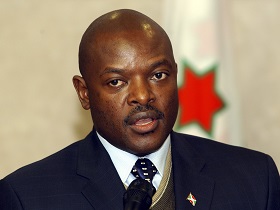After proclaiming independence in 1962, Burundi has survived four coups, seen six presidents violently removed, and experienced several bloody domestic conflicts that almost developed into full-scale genocidal wars. The current outbreak has been caused by the < decision of President Nkurunziza, a Hutu figure, to run for third term in spite of the constitutional ban. Burundi is hardly progressive as far as regime change via fair and general elections is concerned because democracy runs against the old-age African traditions that provide tribal chiefs with lifetime sacral status in the society.
After proclaiming independence in 1962, Burundi has survived four coups, seen six presidents violently removed (although with minor exceptions), and experienced several bloody domestic conflicts that almost developed into full-scale genocidal wars, with a death toll of over 110,000 in the 1972 clashes alone. The civil wars of 1993-2003 were very dramatic, and it was only the intensive intervention by the international community that defused the situation. In 1996-2000, Central and East African states held as many as ten summits on Burundi, with the key peacemaking role performed through vigorous and effective mediation by two African leaders, i.e. Tanzanian President Julius Nyerere who led the process since 1996 until his death in 1999, and his successor South African President Nelson Mandela. In August 2000, the conflicting parties signed the Arusha Peace Agreements that laid the foundation for a peace process through reciprocal compromises on the structure of government, socio-economic policies, the restoration of interethnic harmony, and the observance of democratic rights and liberties.
However, the process of peaceful reconciliation has been thorny and controversial, sometimes interrupted by outbursts of hostilities.
Upon analysis, the Burundi drama seems to indicate that heart of the matter lies in the ethnic conflicts between the Hutu and Tutsi who make the absolute majority of the population. For roughly 200 years before the period of colonization, these peoples lived in peace, whereas in 1966, after the monarchy was overthrown, the calm was shattered. The government became the domain of ethnic groups and regional clans, with a Tutsi president for 26 years, even though the tribe was a minority. But in the late 20th century, the scene had radically changed.
The ethnic factor within the conflicting groups has become less significant as mixed marriages swept both camps and homogeneity declined. Globalization and modernization also have helped in alleviating interethnic tensions. Social scientists say that Hutu-Tutsi intermarriages appear to be well received by the young generation. The older generation is still resisting this, but not as adamantly as before. A propos, the father of the incumbent President Pierre Nkurunziza is a Hutu and his mother is a Tutsi. Hence, it appears equally erroneous for interethnic relations to be either disregarded or overemphasized.
Burundi, one the five poorest countries in the world, continues to experience conflict potential because of its socio-economic environment. According to the World Bank, in 2014 per capita GDP amounted to a meager USD 330.1, with 80 percent of the population living below the poverty line and earning less than two dollars a day. In 1960-2014, Burundi’s populace quadrupled, totaling 9.9 million on a territory of only 27,800 sq. km. As a result, population density reaches 350 per square kilometer. The country is rife with marginalized, asocial residents who earn their keep through crime. Hence, socio-political relations are highly explosive and reliably increase the conflict potential.
The current outbreak has been caused by the decision of President Nkurunziza, a Hutu figure, to run for third term in spite of the constitutional ban. Notably, Burundi is hardly progressive as far as regime change via fair and general elections is concerned because democracy runs against the old-age African traditions that provide tribal chiefs with lifetime sacral status in the society. Moreover, in Africa, the advent of a new leader invariably implies the accession of another clan or another ethnos and radical change in the composition of the ruling class and the business community, since the state remains the main source of financing for private enterprise.
This is the reason why presidential elections in many African countries often bring political instability and violent protests, as has been the case in Burkina Faso, Kenya and Cote d’Ivoire. Family-type regimes exist in Togo and Gabon where the sons of deceased presidents have seized the power. The Burundi situation is extremely tense, with the country balancing on the verge of a civil war and maybe even genocide.
On May 15, Bujumbura experienced a failed military coup against the president, and the situation is still hardly under control. African states and the broader international community are becoming increasingly worried, as they very well remember 1994, when more than 800,000 Tutsi and Hutu were slaughtered in neighboring Rwanda. Besides, an unstable Burundi threatens to fuel the rebel movement in the eastern regions of the Democratic Republic of Congo.
Therefore, as in all previous episodes, Burundi can be hardly normalized in the absence of a major and resolute intervention by the African and international communities. To this end, it appears appropriate to act so that the UN and the African Union are authorized to conduct a peace enforcement mission with the capabilities of a military operation to counter the threats of genocide, mass violations of human rights and a humanitarian disaster.






